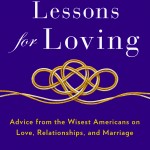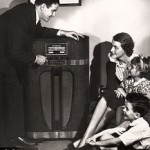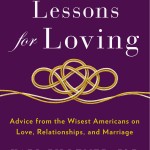In conducting the research for my new book (coming out on January 8), I asked a lot of younger people what they wanted to  know from long-married elders about how to live “happily ever after.” And one of their biggest questions was: How do I know someone is the right – or wrong – one for me? As they so often do, the elders have some great advice.
know from long-married elders about how to live “happily ever after.” And one of their biggest questions was: How do I know someone is the right – or wrong – one for me? As they so often do, the elders have some great advice.
I’ll be blunt. Even though chosing a mate can seem incredibly complicated, the elders have one very simple rule for you
Don’t be dumb in choosing your partner!
Over and over, when it comes to marriage the elders point to decisions that completely ignore the evidence and show bad judgment. They believe there are a set of signs so strong and compelling that they tell you to get out of the relationship. However all too many people ignore the clear warnings and get married — and, the elders tell us, live through a horrendous period (or even an entire married life), suffering the consequences of that dumb decision.
Sifting through hundreds of responses, I learned about four warning signs that should make you very reluctant to commit to a relationship. Most people know these signs are wrong — but hope that they can change their partner or that they won’t matter. The elders say this self-delusion is a huge mistake. And please note: For those of you already in a relationship, these warnings still apply. They are a diagnostic tool for deciding whether your marriage needs a fix (or an exit strategy).
Warning Sign # 1: Violence toward you of any kind
Yes, this point may seem obvious. But I have to put it first and foremost, because entering marriage after experiencing dating violence is still shockingly common, despite decades of warnings from researchers, physicians, and counselors.
On this issue, the elders are unequivocal: If your partner hits you or tries to hurt you in any way, get out. If it happens while you are dating, they firmly state, it will happen in your marriage. As Joan, age 84, put it
Don’t ever, ever get involved with somebody who is abusive at all physically, because you are asking for trouble. They may say that they are going to change and you may think that you will change them – News flash: you are not going to. I tried changing him and I gave up and left. I don’t care how many times person tells you they’re sorry and they’re never going to do that again. I think you find that they do.
I could spend a long time offering you detailed accounts from the elders who made the mistake of marrying someone who had been violent toward them, only to have the physical abuse escalate after marriage. But you probably know it already – make sure to act on it.
Warning Sign # 2: Explosive and Unexplained Anger while Dating
The elders assert that a huge warning sign is explosive and unreasonable anger. They tell you to beware of a person who seems to “get angry over nothing” or “has a bad temper” — anyone whose anger is disproportionate to the situation.
Most important, be aware that these outbursts initially may not be directed toward you. During courtship, they say, people are can keep their anger toward their prospective partner under control. Therefore, you need to look carefully at how he or she responds to frustrating situations and to other people. Annette, 76, dodged a bullet with a man she was getting serious about. She told me:
I dated someone and I was in the subway with him in the city, and we missed the train because we were on the wrong side of the platform. We were walking up the stairs and he took a whole bunch of change out of his pocket and he said some terrible things and threw all of his money down the stairs because he was very angry that we had missed the train. And when that happened, I looked at that person and I said: “This is not a person I want to spend my life with!”
It only was a minute, but you know, it was very telling. You can tell what kind of a person a person is if you miss your plane, if you lose your luggage, if you are caught outside on a rainy day, or something like that. In those stressful situations if they’re going to just stand there and curse up a storm or throw something, ask yourself if want to spend your life with a person with those coping skills.
In fiction and film, someone like this can be attractive in a dangerous way. But in the elders’ long experience, anger that can’t be explained or controlled — even if directed toward others or toward inanimate objects — is a warning sign that can’t be ignored.
Warning Sign 3: Dishonesty — in things large and small
Everyone tells little white lies (in answer to things like “Do these pants make me look fat?”). But the elders say pay careful attention to someone who is dishonest. Clearly, dishonesty to you is a probably deal-breaker. As Pamela, 91, warns:
All the sudden not coming home. Lying about where they’ve been or been with or what they’ve been doing. Secret phone calls. All kinds of things like that. Trust is a big issue and once you lose that, it’s very difficult to regain. You might put it on the back burner but you’re always going to be suspicious.
The elders also suggest you look for even small kinds of dishonesty in your potential mate. Does he or she cheat on tests? Take small items from work? Routinely lie his or her way out of situations? They believe that these are all warning signs of dishonesty that will spill eventually into your relationship.
Warning Sign 4: Sarcasm and Teasing
The problem with these two behaviors is that they are often portrayed as “just in fun.” When you get angry in response, you are accused of “not having a sense of humor.” The elders advise you to beware of anyone who engages in mean-spirited sarcasm or whose teasing crosses the border into aggression.
Barbara, age 70, left her first husband after a few years because she sensed the dark side that lurked behind his sarcasm:
Pay attention to behavioral signs. Somebody who is persistently, consistently, always sarcastic and critical, that should have been a warning sign to me that I was dealing with somebody who couldn’t function very well in the world. So I think that’s something that a young person can look for — this profound kind of sarcasm.
Margaret, age 90, had to reach an agreement with her husband to end teasing in their relationship. She told me:
Teasing is very dangerous. Teasing is like bullying. It demeans the other person, that kind of mocking behavior. It’s supposed to be kidding, but it’s a good warning sign, because it really devalues the other person.
Sometimes love and marriage seem incredibly complicated. But a great thing about talking with the elders is they make it simple and crystal clear: Far too many people make a dumb decision in choosing a mate, and live to regret it for years. By avoiding these four dangerous traps, you can make an intelligent decision — and one that increases your chances of living happily ever after.
For more information on the book and on the Marriage Advice Project, please visit the website, like the project on Facebook, and follow on Twitter:@karlpillemer.
 Americans on Love, Relationships, and Marriage that we want to give something back! So we’re holding a contest where you can win an autographed copy of the book delivered to your front door. All you have to do is share your lessons for loving. Or you tell us about the lessons you’ve learned from a wise elder in your life about love, relationships, and marriage.
Americans on Love, Relationships, and Marriage that we want to give something back! So we’re holding a contest where you can win an autographed copy of the book delivered to your front door. All you have to do is share your lessons for loving. Or you tell us about the lessons you’ve learned from a wise elder in your life about love, relationships, and marriage.






 Wisest Americans on Love, Relationships, and Marriage
Wisest Americans on Love, Relationships, and Marriage 